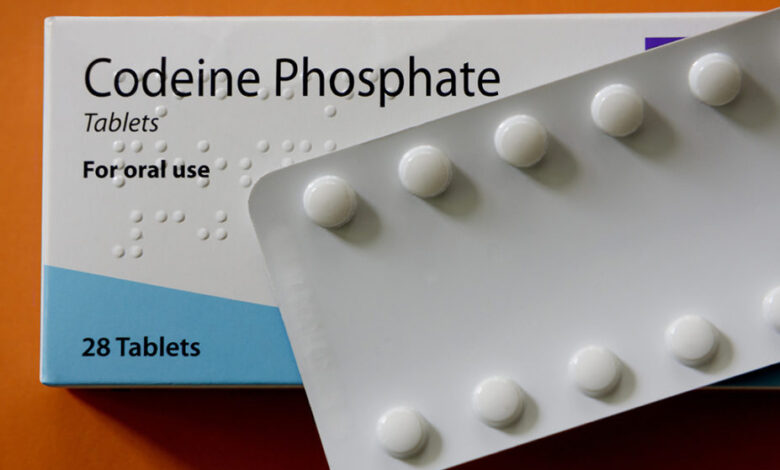Codeine: Uses, How it Works, Side Effects, Addiction

Codeine is an opiate and prodrug of morphine used to treat pain, coughing, and diarrhea and is commonly abused. It is found naturally in the sap of the opium poppy, Papaver somniferum. It is typically used to treat mild to moderate degrees of pain. Codeine is a DEA Schedule II controlled substance. Substances in the DEA Schedule II have a high potential for abuse which may lead to severe psychological or physical dependence.
Codeine is also used, usually in combination with other medications, to reduce coughing. Codeine will help relieve symptoms but will not treat the cause of symptoms or speed recovery. Codeine belongs to a class of medications called opiate (narcotic) analgesics and to a class of medications called antitussives. When codeine is used to treat pain, it works by changing the way the brain and nervous system respond to pain. When codeine is used to reduce coughing, it works by decreasing the activity in the part of the brain that causes coughing.
Codeine is also available in combination with acetaminophen (Capital and Codeine, Tylenol with Codeine), aspirin, carisoprodol, and promethazine and as an ingredient in many cough and cold medications. This article only includes information about the use of codeine. If you are taking a codeine combination product, be sure to read information about all the ingredients in the product you are taking and ask your doctor or pharmacist for more information.
How quickly does codeine work?
When taken orally, codeine typically starts to work within 30 to 60 minutes after ingestion. However, the onset of action can vary among individuals due to factors such as metabolism, dosage, and the individual’s overall health. It’s important to note that the effects of codeine may be influenced by various factors, including the severity of pain, the individual’s tolerance, and the presence of other medications or substances in the system.
The duration of codeine’s effects can vary as well. Immediate-release formulations of codeine typically provide pain relief for around 4 to 6 hours, although the duration can vary among individuals. Extended-release formulations may provide longer-lasting effects, usually lasting around 8 to 12 hours or more.
It’s essential to follow the prescribed dosing instructions and consult with a healthcare professional for accurate information on the onset, duration, and optimal use of codeine based on your specific condition and treatment plan.
How should Codeine be used?
Codeine (alone or in combination with other medications) comes as a tablet, a capsule, and a solution (liquid) to take by mouth. It is usually taken every 4 to 6 hours as needed. Follow the directions on your prescription label carefully, and ask your doctor or pharmacist to explain any part you do not understand. Take codeine exactly as directed.
If you have taken codeine for several weeks or longer, do not stop taking the medication without talking to your doctor. Your doctor may decrease your dose gradually. If you suddenly stop taking codeine, you may experience withdrawal symptoms such as restlessness, widened pupils (black circles in the center of the eyes), teary eyes, irritability, anxiety, runny nose, difficulty falling asleep or staying asleep, yawning, sweating, fast breathing, fast heartbeat, chills, hair on your arms standing on end, nausea, loss of appetite, vomiting, diarrhea, stomach cramps, muscle aches, or backache.
Shake the solution well before each use to mix the medication evenly. Do not use a household spoon to measure your dose. Use the measuring cup or spoon that came with the medication or use a spoon that is made especially for measuring medication.
Other uses for this medicine
This medication is sometimes prescribed for other uses; ask your doctor or pharmacist for more information.
What side effects can this medication cause?
Codeine may cause side effects. Tell your doctor if any of these symptoms are severe or do not go away:
- headache
- stomach pain
- difficulty urinating
Some side effects can be serious. If you experience any of the following symptoms call your doctor immediately or get emergency medical attention:
- agitation, hallucinations (seeing things or hearing voices that do not exist), fever, sweating, confusion, fast heartbeat, shivering, severe muscle stiffness or twitching, loss of coordination, nausea, vomiting, or diarrhea
- nausea, vomiting, loss of appetite, weakness, or dizziness
- inability to get or keep an erection
- irregular menstruation
- decreased sexual desire
- noisy or shallow breathing
- difficulty breathing or swallowing
- changes in heartbeat
- rash
- itching
- hives
- changes in vision
- seizures
Codeine may cause other side effects. Call your doctor if you have any unusual problems while you are taking this medication.
Codeine Safety Information
Codeine may be habit-forming. Take codeine exactly as directed. Do not take more of it, take it more often, or take it in a different way than directed by your doctor. While taking codeine, discuss with your healthcare provider your pain treatment goals, length of treatment, and other ways to manage your pain. Tell your doctor if you or anyone in your family drinks or has ever drunk large amounts of alcohol, uses or has ever used street drugs, or has overused prescription medications, or has had an overdose, or if you have or have ever had depression or another mental illness. There is a greater risk that you will overuse codeine if you have or have ever had any of these conditions. Talk to your healthcare provider immediately and ask for guidance if you think that you have an opioid addiction or call the U.S. Substance Abuse and Mental Health Services Administration (SAMHSA) National Helpline at 1-800-662-HELP.
Codeine may cause serious or life-threatening breathing problems, especially during the first 24 to 72 hours of your treatment and any time your dose is increased. Your doctor will monitor you carefully during your treatment. Tell your doctor if you have or have ever had slowed breathing or asthma. Your doctor will probably tell you not to take codeine. Also tell your doctor if you have or have ever had lung disease such as chronic obstructive pulmonary disease (COPD; a group of diseases that affect the lungs and airways), a head injury, a brain tumor, or any condition that increases the amount of pressure in your brain. The risk that you will develop breathing problems may be higher if you are an older adult or are weak or malnourished due to disease. If you experience any of the following symptoms, call your doctor immediately or get emergency medical treatment: slowed breathing, long pauses between breaths, or shortness of breath.
When codeine was used in children, serious and life-threatening breathing problems such as slow or difficulty breathing and deaths were reported. Codeine should never be used to treat pain or a cough in children younger than 18 years of age. If your child is currently prescribed a cough and cold medicine containing codeine, talk to your child’s doctor about other treatments.
Taking certain medications during your treatment with codeine may increase the risk that you will experience breathing problems or other serious, life-threatening breathing problems, sedation, or coma. Tell your doctor if you are taking or plan to take any of the following medications: certain antibiotics such as erythromycin (Erytab, Erythrocin); certain antifungal medications including ketoconazole; benzodiazepines such as alprazolam (Xanax), diazepam (Diastat, Valium), estazolam, flurazepam, lorazepam (Ativan), and triazolam (Halcion); carbamazepine (Carbatrol, Epitol, Equetro, Tegretol, Teril); certain medications for human immunodeficiency virus (HIV) including indinavir (Crixivan), nelfinavir (Viracept), and ritonavir (Norvir, in Kaletra); medications for mental illness or nausea; other medications for pain; muscle relaxants; phenytoin (Dilantin, Phenytek); rifampin (Rifadin, Rimactane, in Rifamate); sedatives; sleeping pills; or tranquilizers. Your doctor may need to change the dosages of your medications and will monitor you carefully. If you take codeine with any of these medications and you develop any of the following symptoms, call your doctor immediately or seek emergency medical care: unusual dizziness, lightheadedness, extreme sleepiness, slowed or difficult breathing, or unresponsiveness. Be sure that your caregiver or family members know which symptoms may be serious so they can call the doctor or emergency medical care if you are unable to seek treatment on your own.
Drinking alcohol or using street drugs during your treatment with codeine also increases the risk that you will experience these serious, life-threatening side effects. Do not drink alcohol, take prescription or nonprescription medications that contain alcohol, or use street drugs during your treatment.
Tell your doctor if you are pregnant or plan to become pregnant. If you take codeine regularly during your pregnancy, your baby may experience life-threatening withdrawal symptoms after birth. Tell your baby’s doctor right away if your baby experiences any of the following symptoms: irritability, hyperactivity, abnormal sleep, high-pitched cry, uncontrollable shaking of a part of the body, vomiting, diarrhea, or failure to gain weight.
Do not allow anyone else to take your medication. Codeine may harm or cause death to other people who take your medication, especially children.
Your doctor or pharmacist will give you the manufacturer’s patient information sheet (Medication Guide) when you begin treatment with codeine and each time you refill your prescription. Read the information carefully and ask your doctor or pharmacist if you have any questions.
How to Overcome Codeine Addiction
Overcoming codeine addiction can be challenging, but with the right approach and support, it is possible. Here are some steps you can take to address codeine addiction:
1. Acknowledge the Problem: Recognize and accept that you have an addiction to codeine. Acknowledging the issue is the first step toward recovery.
2. Seek Professional Help: Consult with a healthcare professional or addiction specialist who can provide guidance and support throughout your recovery journey. They can help create an individualized treatment plan based on your needs.
3. Detoxification: Codeine addiction often requires a supervised detoxification process. This involves gradually reducing your dosage under medical supervision to minimize withdrawal symptoms and ensure your safety.
4. Therapy and Counseling: Engage in individual therapy or counseling sessions to address the underlying factors contributing to your addiction. Cognitive-behavioral therapy (CBT), motivational interviewing, and other evidence-based therapies can help you understand your triggers, develop coping mechanisms, and modify addictive behaviors.
5. Support Groups: Join support groups or 12-step programs like Narcotics Anonymous (NA) that provide a supportive community of individuals facing similar challenges. These groups can offer guidance, accountability, and a safe space for sharing experiences.
6. Lifestyle Changes: Make positive changes in your lifestyle to support your recovery. This may include adopting healthy habits such as regular exercise, a balanced diet, and sufficient sleep. Engaging in activities that promote physical and mental well-being can help reduce cravings and improve overall resilience.
7. Avoid Triggers: Identify and avoid situations, people, or environments that may trigger cravings or temptations to use codeine. Develop strategies to cope with triggers effectively, such as engaging in alternative activities or seeking support from your network.
8. Build a Support System: Surround yourself with a strong support system that includes friends, family, or support groups who understand and support your recovery goals. Having a network of people who encourage and motivate you can make a significant difference in your journey.
9. Practice Self-Care: Prioritize self-care activities that promote relaxation, stress reduction, and emotional well-being. This can include practicing mindfulness, engaging in hobbies, or pursuing activities that bring you joy and fulfillment.
10. Long-Term Aftercare: Addiction recovery is an ongoing process, so it is essential to maintain your sobriety through long-term aftercare. This may involve regular therapy sessions, attending support groups, and staying connected with your support network.
Remember, overcoming codeine addiction is a personal journey, and recovery timelines may vary for each individual. Be patient, kind to yourself, and celebrate your progress along the way.




